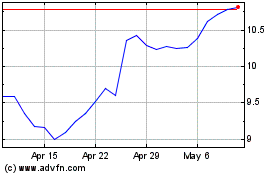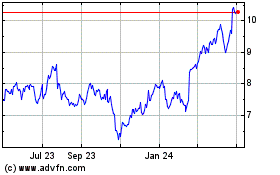By Tripp Mickle and Liz Hoffman
Apple Inc. and Goldman Sachs Group Inc. are preparing to launch
a new joint credit card, a move that would deepen the technology
giant's push into its customers' wallets and mark the Wall Street
firm's first foray into plastic.
The planned card would carry the Apple Pay brand and could
launch early next year, people familiar with the matter said. Apple
will replace its longstanding rewards-card partnership with
Barclays PLC, the people said.
The Apple-Goldman card could help the companies combat
weaknesses in their core businesses. As new iPhone sales growth
slows, Apple is focusing on services such as mobile payments,
streaming-music subscriptions, and App Store sales. Apple Pay,
which generates revenue on each transaction, is a key contributor,
but adoption has been slower than executives hoped.
Goldman, meanwhile, is pushing into consumer banking to
compensate for a slump in securities-trading, where revenue has
fallen by two-thirds since the financial crisis. It launched a
retail banking business called Marcus in 2016 for online savings
accounts and personal loans, and executives have been exploring
adding credit cards and wealth-management tools.
The partnership will extend into other services including
Goldman offering in-store loans to Apple customers buying iPhones
and other gadgets, an effort The Wall Street Journal reported on in
February.
Apple and Goldman are still hashing out the terms and benefits
of the planned card including the perks for customers, these people
said. The current Apple credit card with Barclays offers
interest-free financing on Apple devices and points toward Apple
gift cards.
Apple, Goldman and Barclays declined to comment.
The Apple Pay card is the latest example of a technology giant
broadening its presence in the banking and finance industry.
Besides Apple, Amazon.com Inc., Alphabet Inc.'s Google and Samsung
Electronics Co. are all vying to make mobile payments easier for
consumers while adding to their formidable revenue streams.
Goldman has the potential to raise Apple Pay's profile, tying
the mobile payment service to plastic touted in advertising and
pushed by cashiers at Apple stores.
Apple also stands to boost its revenue by collecting a bounty
from Goldman for each new cardholder, the people said. These
payments, which are common in store-brand cards, can exceed $100
per account. With the Barclays card, Apple declined to collect
bounties and instead put that money toward interest-free financing
of devices.
Additionally, Apple could take a larger cut of mobile payments
from the card if it is used for purchases, the person said.
Currently, when a consumer pays for a purchase using the digital
wallet on the iPhone -- regardless of what credit card the customer
charges -- Apple receives 0.15% per transaction. Apple could more
than double that under the agreement with Goldman, one of the
people said.
The additional revenue could help Apple as it pursues a goal of
doubling its services business to about $50 billion annually by
2020 from $24.35 billion in 2016.
But as Apple shifts from a Barclays card that encourages device
sales with interest-free financing to a card designed to boost
Apple Pay, the challenge could be driving enough of an uptick in
mobile payments to offset any decline of high-price iPhones, iPads
or Macs.
For Goldman, the card could help its nascent retail-banking
operation, launched in 2016, add new customers who may be sold
other banking products. It also deepens the firm's ties to Apple, a
company its bankers have advised in deals and fundraisings for
years.
Without branches or a well-known Main Street brand, Goldman has
relied on referrals, and pays for customer leads from firms
including tax-preparation software maker Intuit Inc. and
personal-finance website Credit Karma Inc. Last month it bought
personal-finance app Clarity Money, gaining access to its roughly
one million users.
Still, the push into credit cards is fraught for Goldman, whose
track record in consumer finance is scarcely two-years old. Credit
cards are a cutthroat business dominated by larger rivals like
JPMorgan Chase & Co. and Citigroup Inc. Yields are falling. And
Goldman lacks much of the infrastructure to be able to issue credit
cards and process payments to merchants.
And after marketing its Marcus products in part by criticizing
credit-card fees and high interest rates, its entry into that
business may invite criticism from consumer advocates and
regulators.
It is unclear which card network -- Visa Inc., Mastercard Inc.
or Discover Financial Services -- will process transactions for the
new card. Apple has had a longstanding relationship with Visa,
which is based in San Francisco.
Barclaycard executives managing the Apple account met at the
tech giant's Cupertino, Calif., office in recent weeks to determine
whether the account -- one of its most high profile -- would be
extended, a person familiar with the meeting said. The bank began
issuing the Apple credit card in 2005.
--AnnaMaria Andriotis contributed to this article.
Write to Tripp Mickle at Tripp.Mickle@wsj.com and Liz Hoffman at
liz.hoffman@wsj.com
(END) Dow Jones Newswires
May 10, 2018 11:53 ET (15:53 GMT)
Copyright (c) 2018 Dow Jones & Company, Inc.
Barclays (NYSE:BCS)
Historical Stock Chart
From Mar 2024 to Apr 2024

Barclays (NYSE:BCS)
Historical Stock Chart
From Apr 2023 to Apr 2024
